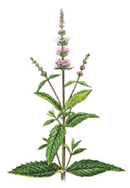
Lobelia
Introduction
This fact sheet provides basic information about Lobelia. Lobelia is a branching, perennial herb that is completely self-fertilizing and reproduces only once in its lifetime (monocarpy).American Indians smoked the leaves as tobacco and used them medicinally for respiratory ailments. Similar folk uses for asthma, chronic bronchitis, whooping cough, cholera, and many other conditions were recorded. Lobelia's emetic properties were well known in the nineteenth century. There are no recent clinical studies to support specific dosage of linden. Classical use of the flowers was at a dosage of 2 to 4 g daily in a tea for coughs and colds.
Common Names
Indian Tobacco, Indian Weed, Pukeweed, Asthma Weed, Gagroot, Vomitwort, Bladderpod, EyebrightLatin Names
Lobelia inflataWhat It Is Used For
- Lobelia inflata and its major alkaloid, lobeline, have been used in smoking cessation programs and have been proposed for treatment of other drug dependencies; however, there is only modest evidence for efficacy.
- Asthma
- Chronic bronchitis
- Pneumonia
- Spastic colon
- Spastic muscle conditions
- Lobelia may also be used externally in connection with diseases of the muscles, joints, and tendons that involve inflammation and degeneration.
How It Is Used
Clinical studies of lobeline for smoking withdrawal used doses of 5 mg twice daily, with 0.5 mg lozenges used in addition when there was an urge to smoke. The useful dose of lobeline is very close to the toxic dose. In use of the whole plant, minor variations in alkaloid content could increase the potential for toxicity.The following are recommended adult doses:
- Dried herb (infusion or decoction): 1/4 to 1/2 tsp herb in 8 oz of water, preferably mixed with other herbs; steep 30 to 40 minutes. Take 2 oz four times per day. (This method is not preferred because of lobelia's acrid taste.) The following are recommended adult doses:
- Liquid extract (1:1 in 50 alcohol): 0.2 to 0.6 mL three times per day
- Tincture of lobelia: 0.6 to 2.0 mL per day
- Adjust the recommended adult dose to account for the child's weight. Most herbal dosages for adults are calculated on the basis of a 150 lb (70 kg) adult. Therefore, if the child weighs 50 lb (20 to 25 kg), the appropriate dose of lobelia for this child would be 1/3 of the adult dosage.
What the Science Says
- At high doses, lobeline induces sensations of choking or breathlessness.
- Lobeline has been studied for its ability to improve learning and memory. Mice treated with lobeline for 5 days before training showed improved performance in a water maze; however, the effect was limited to younger mice.
- One unconfirmed study attributed antidepressant activity to a fatty acid ester of a common triterpene; however, no further work has substantiated this report.
Side Effects and Cautions
- As might be deduced from the common names for the plant, Lobelia and lobeline are capable of inducing nausea, vomiting, and dizziness at high doses (8 mg lobeline sulfate).
Sources
- Drugs.Com Web site. Accessed on February 7, 2009.
- From Wikipedia, the free encyclopedia. Accessed on February 7, 2009.






